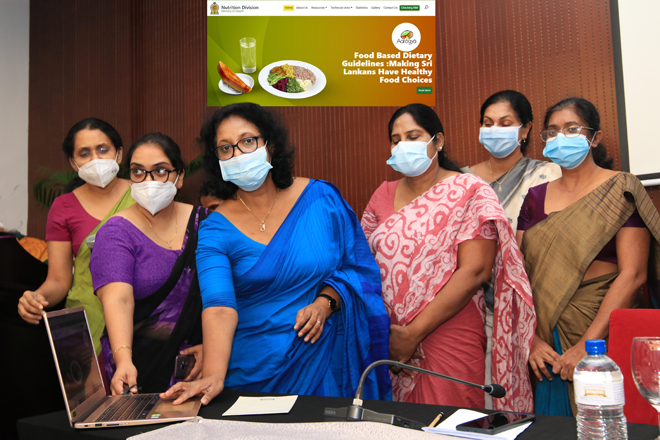Dec 11, 2020 (LBO) – The Ministry of Health, Nutrition and Indigenous Medicine with support from the Food and Agriculture Organization of the United Nations (FAO) launched the Sri Lanka Food-Based Dietary Guidelines (FBDGs) at an event held in Colombo.
Country specific FBDGs are one of the FAO/WHO recommended tools to improve healthy eating habits and lifestyles of individuals and populations. Sri Lanka was one of the countries to endorse the FBDGs in the Framework for Action agreed at the Second International Conference on Nutrition.
The Food-Based Dietary Guidelines (also known as dietary guidelines) are intended to establish a basis for public food and nutrition, health and agricultural policies and nutrition education programmes to foster healthy eating habits and lifestyles.
The guidelines provide advice on foods, food groups and dietary patterns to provide the required nutrients to the general public to promote overall health and prevent chronic diseases.
Sri Lanka first published food-based dietary guidelines in 2002. A revised version was launched in 2011.
“A quick reference guide with the most relevant facts for better nutrition is a public need,” said Dr Susie Perera, Deputy Director General, Public Health Services of the Ministry of Health. “A lot of hard work in the form of extensive research and stakeholder consultations went into the development of this guideline. A wide circulation to empower people with these facts are needed. Therefore the next steps of implementation and dissemination of the dietary guidelines are equally important."
The guidelines were developed by the Nutrition Division of the Ministry of Health, in consultation with various government ministries, universities, nutrition associations and institutes, consumer and non-governmental organizations.
Technical and financial support was extended by FAO. The guidelines are adapted to the country’s nutrition situation, food availability, culinary cultures and eating habits.
“FAO assists Member Countries to develop, revise and implement food-based dietary guidelines and food guides in line with current scientific evidence, “said Dr Xuebing Sun, FAO Representative for Sri Lanka and the Maldives. “Sri Lanka is a country that is facing a triple-burden of malnutrition from staggering rates of stunting and wasting among children, micronutrient deficiencies, and overweight and obesity especially among women of reproductive age. The causes of malnutrition are complex and multilayered, yet diet is one of the single most important contributors to malnutrition. These food-based dietary guidelines can favorably impact diets and the food systems in Sri Lanka, from production to consumption,” Dr Sun noted.
The revised Sri Lanka Food-Based Dietary Guidelines will be published and be made available to the public on the website of the Nutrition Division of the Ministry of Health.
Food-Based Dietary Guidelines Key Messages
· Add variety to your daily meals balancing the correctamounts.
· Eat whole grains including rice and their products which are parboiled or less polished instead of refined grains and products.
· Limit sugary drinks, biscuits, cakes, sweets and sweeteners.
· Add fish or egg or lean meat with pulses in each meal.
· Eat at least two vegetables, one green leafy vegetable and two fruits daily.
· Eat a handful of nuts or oily seeds daily.
· Have fresh milk or its fermented products.
· Limit salty foods and adding salt to foods.
· Water is the healthiest drink: drink 8 to 10 glasses (1.5 – 2.0l) throughout the day.
· Be active: engage in exercises at least for 20 minutes every day.
· Sleep 7 – 8 hours continuously every day.
· Eat clean and safe food.
· Eat fresh and home cooked food: limit processed and ultra-processed food.
· Always read labels of packaged foods.

